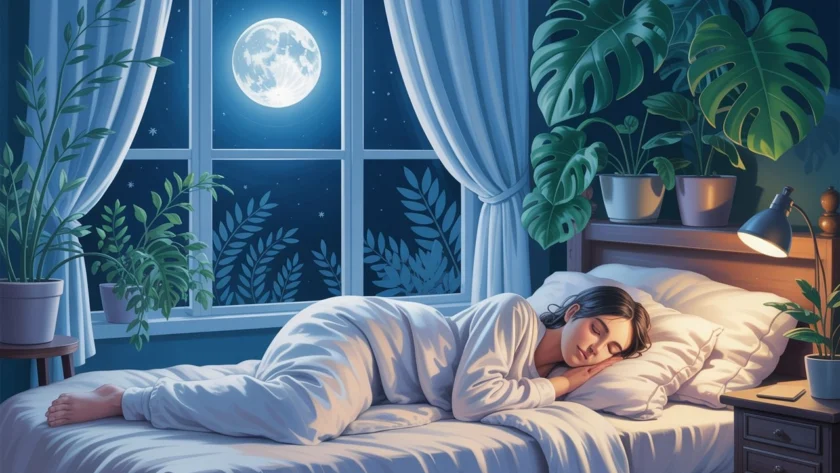The clock reads 2:47 AM, and there you are—eyes wide open, heart racing slightly, mind replaying tomorrow’s to-do list for the hundredth time. Sound familiar? That restless, anxious energy that keeps us staring at the ceiling isn’t just frustrating; it’s part of a vicious cycle that many of us know all too well. Poor sleep feeds anxiety, and anxiety sabotages sleep. But here’s what years of wrestling with this pattern have taught me: when we learn to honor the connection between rest and peace, we can start breaking free from this exhausting loop.
Scripture tells us that God “grants sleep to those he loves” (Psalm 127:2), yet so many of us lie awake night after night, wondering why rest feels so elusive. The truth is, sleep isn’t just about physical restoration—it’s deeply connected to our emotional and spiritual well-being. When we’re sleep-deprived, our anxiety symptoms intensify, our ability to cope diminishes, and even our faith can feel shakier. Understanding this connection isn’t about adding guilt to our sleepless nights; it’s about discovering practical pathways toward the rest our bodies and souls desperately need.
How Sleep and Anxiety Feed Each Other
Let’s talk about what’s really happening when anxiety and poor sleep become tangled together. Our brains need quality sleep to regulate emotions, process stress, and maintain perspective. When we don’t get enough rest, the amygdala—that alarm center in our brain—becomes hyperactive. Essentially, we’re walking around with our internal fire alarm set to maximum sensitivity, ready to sound at the slightest provocation.
After a sleepless night, everyday stressors that we’d normally handle feel overwhelming. That difficult conversation with a coworker? Suddenly feels catastrophic. The grocery store checkout line? Triggers disproportionate frustration. This isn’t weakness or lack of faith—it’s simple biology. Our sleep-deprived brains literally process threats differently, making anxiety symptoms worse.
What makes this particularly challenging is how anxiety disrupts sleep in return. Racing thoughts keep us awake. Worries about tomorrow prevent us from relaxing into rest. Physical tension makes it hard to get comfortable. Before we know it, we’re lying in bed anxious about being anxious about not sleeping—and the cycle deepens.
Here’s something that changed my perspective entirely: recognizing that God designed our bodies to need rest wasn’t a revelation about weakness, but about wisdom. When Jesus withdrew to quiet places to rest and pray, He was modeling something essential for our well-being. Rest isn’t optional—it’s part of how we’re created to function.
The Biblical Foundation for Rest
Throughout Scripture, we see God’s heart for rest woven into the very fabric of creation. He didn’t just suggest the Sabbath as a nice idea; He embedded it into the rhythm of life itself. “Come to me, all you who are weary and burdened, and I will give you rest” (Matthew 11:28). This invitation isn’t just about spiritual rest—it encompasses our whole being, including our physical need for sleep.
What’s beautiful about this is that prioritizing sleep becomes an act of trust. When we choose rest over staying up late worrying, we’re essentially saying, “God, you’ve got this. The world won’t fall apart if I sleep.” That’s not easy for those of us with anxiety. We want to stay vigilant, to maintain control, to keep problem-solving. But there’s something profoundly spiritual about laying down our burdens each night and trusting that God will sustain us and handle what we cannot.
The Psalms are filled with references to peaceful sleep: “In peace I will lie down and sleep, for you alone, Lord, make me dwell in safety” (Psalm 4:8). David wrote those words while facing genuine threats, yet he found rest by anchoring his trust in God’s protection. That same practice can transform our approach to sleep today.
Creating a Sleep Schedule That Honors Your Body’s Needs
One of the most powerful tools for managing anxiety through better sleep is establishing a consistent sleep schedule. Our bodies thrive on predictability—they want to know when it’s time to wind down and when it’s time to be alert. This internal clock, called our circadian rhythm, affects everything from hormone production to mood regulation.
The goal is simple but requires commitment: go to bed at roughly the same time each night and wake up at the same time each morning—even on weekends. Yes, even on weekends. This consistency might feel restrictive at first, especially if you’re used to “catching up” on sleep during days off. But what actually happens when we maintain irregular sleep patterns is that we keep our bodies confused, never allowing our internal systems to settle into a reliable rhythm.
Start by choosing a bedtime that allows for seven to nine hours of sleep before your alarm goes off. Work backward from when you need to wake up. If that bedtime feels impossibly early given your current habits, don’t try to shift everything overnight. Move your bedtime fifteen minutes earlier each week until you reach your target time. This gradual approach gives your body time to adjust without the shock that might increase anxiety.
What about those nights when sleep just won’t come? This is where anxiety and sleep hygiene collide most intensely. The general rule is: if you’ve been lying awake for more than twenty minutes, get up and do something quietly relaxing in dim light. The goal is to avoid teaching your brain that bed equals frustration and wakefulness. Return to bed only when you feel genuinely drowsy.
Building a Bedtime Routine That Signals Safety
Think of your bedtime routine as a bridge between the chaos of the day and the peace of sleep. This isn’t about perfection; it’s about creating a series of calming signals that tell your body, “It’s safe to rest now.”
Start winding down about an hour before your target bedtime. This buffer zone is crucial because we can’t go from full-speed activity to deep sleep in five minutes—our bodies don’t work that way. During this hour, gradually shift into restful mode through activities that soothe rather than stimulate.
Lower the lights throughout your home as evening progresses. Bright lights signal to our brains that it’s daytime, suppressing melatonin production and keeping us alert. Warm, dim lighting has the opposite effect, gently cueing our bodies that darkness—and therefore sleep—is approaching.
Consider what activities genuinely calm your nervous system. For some people, a warm bath or shower works wonders. The slight drop in body temperature after getting out actually promotes sleepiness. Others find comfort in gentle stretching, reading something peaceful (not from a screen), or listening to quiet music. What matters is consistency—doing similar activities each night creates that bridge your body learns to cross.
This is also a beautiful time for spiritual practices that ease anxiety. Praying through your worries instead of rehearsing them shifts your focus from problems to God’s presence. Reading a Psalm or devotional passage can replace anxious thoughts with truth. Some people find it helpful to journal briefly, transferring concerns from mind to paper—essentially handing them over to God before sleep.
One practice that’s been transformative: ending the day with gratitude. Anxiety trains us to scan for threats and problems. Deliberately acknowledging three good things from the day, no matter how small, retrains our brains to notice evidence of God’s faithfulness. “This is the day the Lord has made; let us rejoice and be glad in it” (Psalm 118:24)—even if the day was hard, there’s something to acknowledge with thanks.
Optimizing Your Sleep Environment for Peace
The space where we sleep matters more than we often realize. Our bedrooms should be sanctuaries—places that immediately communicate rest and safety to our anxious minds and bodies.
Temperature plays a bigger role than most people think. Our bodies sleep best in cooler environments, typically between 60-67 degrees Fahrenheit. When the room is too warm, we toss and turn, struggling to get comfortable. This might mean adjusting your thermostat, using lighter blankets, or simply cracking a window. Physical comfort is not a luxury when we’re trying to reduce anxiety; it’s a necessity.
Darkness signals to our brains that it’s time for deep sleep. Even small amounts of light—from electronics, streetlights, or hallway lamps—can interfere with melatonin production and sleep quality. Consider blackout curtains, an eye mask, or simply covering any small lights from devices. Your bedroom should feel like a peaceful cave when it’s time to sleep.
Noise can be trickier to address, especially if you live in a busy area or with others. Some people sleep better with white noise or gentle nature sounds that mask unpredictable disturbances. Others need absolute quiet. There’s no right answer here—experiment to discover what helps you feel most settled. The goal is to minimize disruptions that might trigger that anxious startle response in the middle of the night.
Now, let’s address the elephant in the bedroom: screens. Phones, tablets, TVs, and computers emit blue light that mimics daylight, telling our brains to stay alert. Beyond the light issue, the content we consume before bed often stimulates rather than soothes. Checking email, scrolling social media, or watching intense shows right before sleep feeds anxiety rather than calming it.
The recommendation to avoid screens for an hour before bed might feel extreme, but it’s profoundly effective. If that feels impossible, at least enable night mode or blue light filters on your devices, and be intentional about what you consume. Swapping scrolling time for prayer, reading, or quiet conversation changes everything.
Consider what your bedroom represents. Is it just where you sleep, or is it also your office, your TV room, your phone-scrolling spot? The more activities we do in bed, the more our brains associate it with wakefulness rather than rest. As much as possible, reserve your bed for sleep and intimacy only. This strengthens the mental connection between bed and rest.
Lifestyle Habits That Support Both Sleep and Calm
What we do during the day profoundly affects how we sleep at night. These aren’t separate issues—they’re intimately connected. When we make choices throughout the day that support our nervous system, nighttime rest comes more naturally.
Exercise is one of the most powerful tools we have for both anxiety management and sleep quality. Physical activity helps burn off excess stress hormones, tires our bodies in healthy ways, and promotes deeper sleep. The key is timing—vigorous exercise too close to bedtime can be energizing rather than relaxing. Aim to finish moderate to intense workouts at least three to four hours before bed.
Caffeine deserves special attention because many of us underestimate its impact. That afternoon coffee might feel like it’s not affecting us, but caffeine has a half-life of about five hours. This means that half of the caffeine from a 3 PM cup is still in your system at 8 PM, potentially interfering with sleep initiation and quality. Consider making your last caffeinated beverage by early afternoon, or switching to decaf or herbal tea as evening approaches.
What we eat and when we eat it also matters. Heavy meals too close to bedtime can cause discomfort that disrupts sleep. Going to bed hungry can do the same. A light snack that combines protein and complex carbohydrates about an hour before bed can actually support better sleep—think whole grain crackers with nut butter or a small bowl of oatmeal.
Alcohol is particularly deceptive. Yes, it might make you feel drowsy initially, but it significantly disrupts sleep architecture later in the night, leading to fragmented, poor-quality rest and often increased anxiety the next day. If you drink alcohol, finish at least three hours before bedtime and stay well hydrated.
When Anxiety Makes Sleep Feel Impossible
Let’s be honest: sometimes anxiety is so intense that no amount of good sleep hygiene feels like enough. Racing thoughts won’t quiet down. Physical tension won’t release. The harder we try to sleep, the more elusive it becomes. These nights can feel desperate and lonely.
First, please hear this: struggling to sleep doesn’t mean you’re failing or lacking faith. Jesus himself experienced sleepless anguish in the Garden of Gethsemane. Anxiety that disrupts sleep is a real struggle, not a spiritual deficiency.
When anxious thoughts are particularly intrusive, try the “worry postponement” technique: keep a notepad by your bed and briefly jot down worries that arise, then intentionally set them aside with a prayer. You’re not dismissing your concerns; you’re acknowledging them and choosing to address them tomorrow when your mind is rested. There’s something freeing about physically writing worries down—it’s like transferring them from your mind to the paper, and ultimately to God’s capable hands.
Breathing exercises can be remarkably effective for calming an anxious body. Try the 4-7-8 pattern: breathe in quietly through your nose for 4 counts, hold your breath for 7 counts, then exhale completely through your mouth for 8 counts. Repeat this cycle three to four times. This practice activates your parasympathetic nervous system—the “rest and digest” mode—helping counteract anxiety’s “fight or flight” response.
Progressive muscle relaxation is another tool worth learning. Starting with your toes and working up to your head, systematically tense and then release each muscle group. This helps release the physical tension that anxiety creates and brings awareness to how relaxation actually feels in your body.
Some nights, despite our best efforts, sleep simply won’t come easily. On these nights, be gentle with yourself. Resting peacefully, even without sleeping, still provides some benefit. As you lie there, practice the presence of God. Psalm 63:6 says, “On my bed I remember you; I think of you through the watches of the night.” Those quiet, wakeful hours can become times of intimate conversation with God rather than anxious spirals.
Professional Help and Persistent Sleep Issues
If you’ve implemented these sleep hygiene practices consistently for several weeks and still struggle significantly with sleep and anxiety, it may be time to seek professional support. This isn’t admitting defeat—it’s taking wise action.
Sleep disorders like sleep apnea, restless leg syndrome, or insomnia can coexist with anxiety and require medical attention. A healthcare provider or sleep specialist can evaluate whether there’s an underlying condition that needs treatment beyond lifestyle changes.
Similarly, if anxiety is consistently preventing sleep, a therapist specializing in anxiety disorders can provide targeted strategies like cognitive behavioral therapy for insomnia (CBT-I), which is highly effective. Sometimes medication may be appropriate as a temporary bridge while developing better sleep patterns and anxiety management skills.
Seeking help is not a failure of faith. God has given us medical knowledge and mental health professionals as resources for healing. Using them wisely is an act of stewardship for the body and mind He’s given us.
Moving Forward With Hope
Better sleep won’t eliminate anxiety overnight—healing is rarely that simple or immediate. But improving sleep hygiene creates a foundation from which we can more effectively address anxiety. When we’re well-rested, we have more emotional resilience, clearer thinking, and greater capacity to engage with spiritual practices that bring peace.
Start small. Choose one or two changes from this article that resonate most with you. Maybe it’s establishing a consistent bedtime. Perhaps it’s creating a simple wind-down routine. Or it could be finally removing that TV from your bedroom. Small, consistent changes compound over time into significant transformation.
As you work on improving your sleep, remember that rest is a gift from God, not something you have to earn through perfect performance. Some nights will be better than others, and that’s okay. Progress, not perfection, is the goal. “He gives his beloved sleep” (Psalm 127:2, ESV)—this promise is for you, even in the midst of anxiety’s challenges.
May you find the courage to prioritize rest as an act of faith, trusting that God is working even while you sleep. May your bedroom become a sanctuary of peace. And may the connection between better sleep and reduced anxiety become increasingly evident in your life, bringing you closer to the abundant rest that Christ promises to all who come to Him.
Sleep well, dear friend. You’re held in God’s care through every wakeful moment and every peaceful night.




